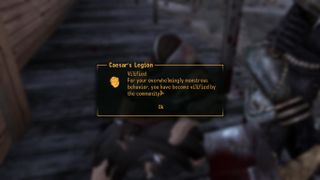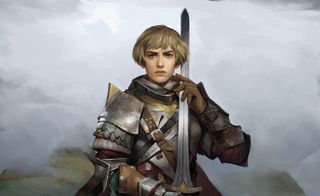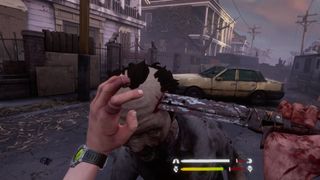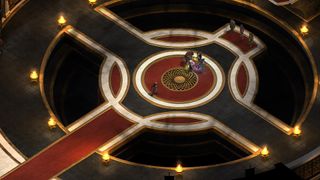
Find all previous editions of the PCG Q&A here. Some highlights:
- Have you tried to make your own game or mod?
- What's something about games you didn't mind as a kid but can't stand now?
- What was the best game on your school computers?
The big moral choice was a selling point in narrative games for a long time. They were seen as so essential they were shoehorned into BioShock even though Ken Levine didn't want them, just because they made a good back-of-the-box feature. Lately, though, they've been rarer. RPGs like Disco Elysium and The Outer Worlds have given us some tough decisions, but they feel like exceptions. BioWare haven't made one of these games for a while, Telltale aren't around any more, and few other developers have stepped up to the plate.
When's the last time a game gave you a tough moral choice? Here are our answers, plus a few from our forum.

Emma Matthews: I played through Fallout: New Vegas last year to get in the mood for The Outer Worlds, and it's filled with moral choices. I was determined to take out Mr. House for the latter portion of the game, and didn't hesitate when I finally arrived at his little pod. New Vegas' abrupt ending and quick summary reminded me that it didn't have to end that way, though. It didn't feel like a tough decision at the time, but after reading a few threads that explored the other options, where they led, and why people picked them, it forced me to think about my hasty decision.
James Davenport: On brand yet again: I dig the ending of Dark Souls. Any Dark Souls game, really. You're given the opportunity to link the fire or put that shit out, and in this scenario, the fire represents Mankind. Putting it out eliminates all people, everywhere, until the eternal dragons and whatever else get bored or accidentally fuck something up that leads to the creation of humanity again. The problem here is choosing between perpetuating the thieving, insatiable thirst for power that man kinda just puts out into the world or saying hell no, let these stones rest, violence isn't the answer, neither is life or death or anything in between. It kinda boils down most big moral questions in videogames. Awareness or nothing? Make the big moral choice, you all-knowing gamer, you.
Andy Chalk: I finally got around to playing Soma a few months ago, and if you've played it you probably already know which moment I'm talking about. (And if you haven't, major spoiler ahead, and believe me, you don't want to spoil this if you have any intention of playing it someday.)
Around the midpoint of the game, the lead character's consciousness is transferred into a new body—except it's not a transfer, it's a copy, leaving the "original" unconscious but alive. At that point you're given a choice: Leave him (that is, the former and technically still you) behind, trapped forever in a hellish underwater nightmare with no hope of escape, or switch off the life support, euthanizing him, to save him from the horror. The decision has no real impact on the game, there's no morality system tracking your progress and nothing to be gained or lost from going either way. No right or wrong at all, really. It's just a big, deeply messed-up choice that lands out of nowhere, and you're stuck with making it.

Jody Macgregor: The Outer Worlds asked me to choose between corporations who bury people in debt over funeral fees on one side, and rebel outsider environmentalists on the other. I went with the latter knowing full well that the game was going to pull the rug out from under me with a "well actually" at some point, and when it did I rolled my eyes and doubled down on the side I'd already chosen. It felt artificial and predictable and had no impact on me at all, which unfortunately was true of a lot of The Outer Worlds. (Except for Parvati's sidequest, obv.) I want games to keep trying this stuff, but reducing morality to an immediate gotcha like this doesn't work anymore.
The biggest gaming news, reviews and hardware deals
Keep up to date with the most important stories and the best deals, as picked by the PC Gamer team.
From our forum
Pifanjr: I was playing Mass Effect as a complete paragon. I don't even remember if this was in the first or second game or even what the context was, but I remember having to choose between sparing someone and killing them and my finger hovered over the renegade button for a while, knowing my time was running out, not being able to make the decision.
I don't remember what decision I made. I do think I made one before the timer ran out. I think I might've actually chosen the renegade option and reloaded to change it, but I'm not sure. I really only clearly remember that moment of indecision about whether this guy was worth sparing.

Frindis: The Arl of Redcliffe quest from Dragon Age: Origins and the decision you have to take at the end of it. It was not easy and when all was done, I walked out feeling like I was the bad guy.
McStabStab: Thronebreaker: The Witcher Tales had some tough decisions that made me wonder how another playthrough might go. Also Frostpunk. You’re often choosing one evil over another, trying to balance resources, hope, and what’s left of humanity. The first time you mix sawdust into the food or execute someone over the steam vents you may start to feel your conscience nagging you.
zippygeorgeandben: I find myself in dilemmas everytime I have to create a character on a game. Lasts about 2 hours!

Zloth: Pathfinder: Kingmaker had a good one. Nok-Nok built a statue to his deity, the Mother of Monsters. The city folks were NOT pleased about a statue to an evil deity being built, even if it was outside of town. My neutral-good character certainly wasn't going to be happy, either. The thing is, Nok Nok was far and away the best character in my party. He had saved us countless times already and would do so many more times in the coming months. He had earned the right to some autonomy!
I stared at the screen for a good while on that one but eventually made him tear it down. I reasoned that, if Nok Nok didn't tear it down now, some mob of city folks would try and sneak in to do it and probably get themselves killed in the process. My city could tear itself apart over something like that, so down the statues went.

XoRn: In The Walking Dead: Saints and Sinners the very first quest giver asks you to kill her turned husband, and bring his wedding ring back to her. She's lost contact with her children and once in possession of the ring hopes to set out and find them. When you complete the quest (SPOILERS, but again, it's the VERY first quest of the game really), you discover a letter written by the husband, a shotgun, and two small bodies covered with bloody sheets. Even without the confession on the letter, the implication is obvious.
When you return the ring you're given the choice to tell her about the children or not. If you tell her she becomes furious with you and demands proof, which you can provide with the letter. If you don't tell her, then she simply thanks you and gives you your quest reward.
It's a harsh introduction to the world of The Walking Dead (for someone who has never bothered with the show at least) and made all the grim when you realize you can kill NPCs. Now on top of your initial choice you might just grapple with having to commit an additional act of violence that you might feel justified in doing, regardless of if you told her or not.
Sinner: That ring looked like it might be worth something after all.
Saint: "Tell me about the rabbits George..."
Dakkon: Telltale's The Walking Dead series, especially The Last Season where you care about AJ and your decision making actually determines and influences his upbringing and understanding what's good and what's wrong.

Sarafan: It has to be Tyranny. The game is full of tough choices, if you prefer to play as a good character. But one moment owns it all. In one of the chapters you have to decide about the fate of a newly born child. The Kyros's will is to kill it. The player has an option to do a workaround, but it's still an extremely hard moment, especially if you're playing a character which doesn't oppose Kyros. I couldn't do it and decided to go with the workaround. It's only a game, but it felt so bad! The mind is not that easy to reason if you're fully immersed in a game.
invader: The one that comes to mind at this point is on Phoenix Wright 2 final case. In it you have to extend the case for as long as you can because the life of your dear friends are on the line and need time for a friend/antagonist to rescue them. The game was brilliant in making me suffer through all the trial to get a little more time and you get to the point that there is absolutly no more ways to drag the case, no more clues, discussions and/or questioning. and you have to make the decision to end it one way or another. It was horrible to decide if the fuc%&$ was going to walk away or my friends died

Johnway: The last game that made put me in a tough moral dilemma was Prey. In fact there was 2 situations that made you decide the fate on survivors lives. That's not counting on the people who you could rescue or kill them.
If you don't want to know, look away now:
The first was in the testing lab where you had someone who was stuck in a test chamber who was a live subject to a horrible experiment. If you spare him, he would give you the code to the armory where a prize shotgun, mobile turrets and ammo awaits. Kill him and you get valuable crafting resources. What makes it tricky? if you read the volunteer's record before hand you'll discover that he is apparently a pedophile that lies through life selling drugs and trafficking or kidnapping people. Scum of the earth. Can you trust this man? Does this man deserve to die? he does plead for his life, but can you trust him or is it another act?
My decision: Spare him. There was only humans and aliens and i would trust humans over the alien threat that couldn't be reasoned with. Plus i already raided the armory without his help. I managed to shoot a plastic dart at the lock and open it from the other side. if he wanted to betray me, i already had the shotgun ready to deliver swift justice.
The second one is slightly more detached but no less harrowing. A space shuttle left just minutes before the carnage on the station began. The shuttle wasn't properly checked and its about to land on Earth! it might be ok, after all nothing turned up on security scans... But then again, they weren't searching for typhon...
Do we scuttle the craft killing everyone innocent onboard or do we pray its safe and let it return to Earth but risk it spreading uncontrollably?
my decision after a bit of thinking? Scuttle it. The risk was too great. Better to be safe rather then sorry.
The collective PC Gamer editorial team worked together to write this article. PC Gamer is the global authority on PC games—starting in 1993 with the magazine, and then in 2010 with this website you're currently reading. We have writers across the US, UK and Australia, who you can read about here.
Most Popular

